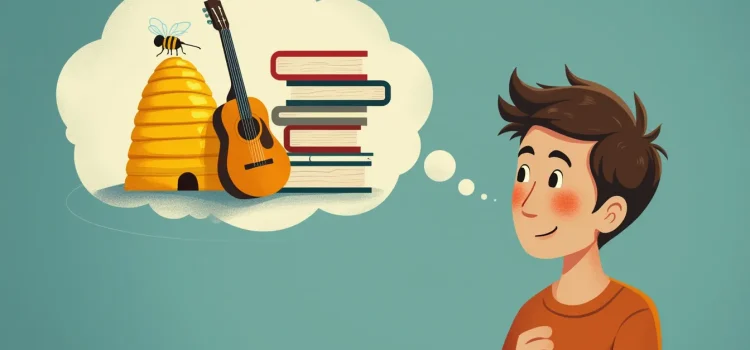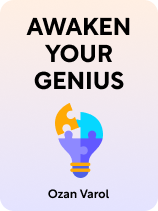

This article is an excerpt from the Shortform book guide to "Awaken Your Genius" by Ozan Varol. Shortform has the world's best summaries and analyses of books you should be reading.
Like this article? Sign up for a free trial here.
What are you curious about? How can you reclaim your authentic interests and independent thinking?
In Awaken Your Genius, Ozan Varol explores the suppression of natural curiosity in traditional education systems. He offers insights on rediscovering your true self and nurturing your innate wonder about the world.
Keep reading to get Varol’s techniques for rekindling your innate curiosity.
What You’re Curious About
What are you curious about—truly? Varol contends you’ve been taught to repress your true self—which includes your curiosity—since you started school. In school, you experienced pressure to put aside your own interests and original ideas and learn to replicate the status quo. You were expected to memorize facts about the world instead of indulging in wonder and critical thinking. For example, you were probably taught that bees make honey without being encouraged to explore why this is true or question how this knowledge was discovered. This approach to education crushes your innate curiosity and diminishes your ability to think independently (which are two facets of your true self).
(Shortform note: Varol criticizes the traditional education model for crushing kids’ innate curiosity and training them to replicate the status quo, but there may be some value to this model. Because the traditional education model covers the fundamentals of a wide variety of subjects, kids attain a baseline understanding of the world that helps them contribute to society in meaningful ways as adults. Some critics of the traditional education model practice unschooling, an approach that prioritizes letting kids explore their authentic interests. But some evidence suggests that unschooling often fails because when kids don’t memorize basic facts, they never develop basic competencies—and their critical thinking skills may suffer, too.)
Since your education crushed your natural curiosity and discouraged you from thinking independently, Varol suggests that you reclaim these aspects of your true self using two techniques.
Discover your authentic interests. Varol explains that often, your authentic interests overlap with your talents. For instance, if you have a green thumb, you likely have an authentic interest in gardening. But you shouldn’t always stay in your comfort zone—by experimenting with new ideas and activities, you can discover new interests and hidden passions. For example, say you notice bees buzzing around your flowerbed and allow yourself to wonder about their behavior. This curiosity could lead you to explore beekeeping as a new hobby. Varol says that having a wide range of interests enhances your creativity, as you draw connections between different fields and experiences, and ensures that you always have something innately fulfilling to do.
(Shortform note: If you’re having trouble discovering your authentic interests, experts recommend that you start by asking yourself how you want to feel, as this can guide you toward activities that fill gaps in your life. For example, say you’re a busy person who’d like to enjoy some solitude; you might be drawn to activities like reading, hiking, or painting, which can provide you with peaceful, reflective time. Experts also recommend making a list of activities that intrigue you so that when you have spare time in the future, you can explore a variety of possibilities. They may not all resonate with you, but some might—and, as Varol says, variety improves your chances of finding fulfillment.)
Find out what you think about your interests. Once you discover your authentic interests, practice thinking independently about them. Say you’re curious about beekeeping. Before seeking outside information on the practice, take some time to explore your own ideas about it. What do you find intriguing about beekeeping? How do you think it works? Varol says this approach helps you engage deeply with your interests and develop a personal connection to them. You can then turn to outside sources—but don’t accept what they say as fact. Think about how their ideas compare to yours instead. According to Varol, this kind of deep, independent thinking is where innovative and meaningful ideas come from.
(Shortform note: Some people find that they think best when they’re writing because the writing process helps them understand and develop their ideas. If that’s true for you, you might consider keeping an idea journal—a repository of all your ideas. Idea journals can be physical or digital, but some research suggests that writing by hand may help you think through your ideas. Keeping an idea journal can also help you integrate the initial thoughts you have about a topic with what you learn later by doing outside research. For example, if you’re interested in beekeeping, you might first journal about why it interests you and what you think you might need to get started. Once you’ve done some outside research, you can update your list of supplies.)
Exercise
- Varol says your education taught you to seek facts from outside sources, not to think independently. Bring to mind something that you’ve been wondering about. What can you conclude about it without consulting outside sources?
- Recall an activity or idea you were genuinely interested in as a child. What did you enjoy about it? What does that tell you about yourself?

———End of Preview———
Like what you just read? Read the rest of the world's best book summary and analysis of Ozan Varol's "Awaken Your Genius" at Shortform.
Here's what you'll find in our full Awaken Your Genius summary:
- The reasons why you’ve abandoned your true self so far in life
- A former rocket scientist’s tips for embodying your true self
- How to achieve creative fulfillment and personal growth






